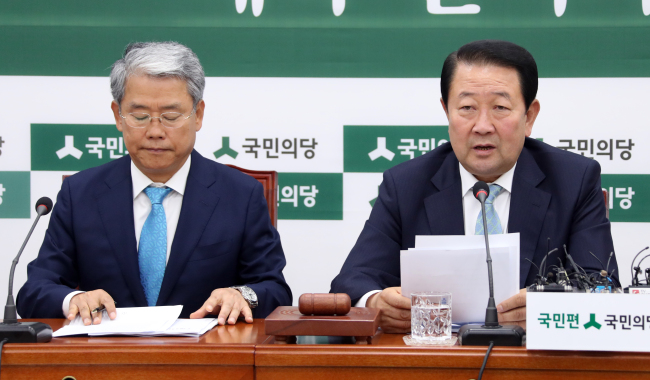[News Focus] People’s Party in dilemma as key voting bloc
By Jo He-rimPublished : June 6, 2017 - 18:20
A small opposition party with just 40 parliamentary seats is enjoying an outsized say in the parliamentary process and in President Moon Jae-in’s key personnel choices and policy pushes.
But the People’s Party is also finding itself in a deepening dilemma over its relations with the new liberal administration led by the Democratic Party of Korea with which it shares the same political roots.
In last week’s parliamentary endorsement of Prime Minister Lee Nak-yon, the centrist party became a key ally for the 120-member ruling Democratic Party and passed the vote on Lee through the 299-member National Assembly.
But the People’s Party is also finding itself in a deepening dilemma over its relations with the new liberal administration led by the Democratic Party of Korea with which it shares the same political roots.
In last week’s parliamentary endorsement of Prime Minister Lee Nak-yon, the centrist party became a key ally for the 120-member ruling Democratic Party and passed the vote on Lee through the 299-member National Assembly.

Now with another figure -- Fair Trade Commission nominee Kim Sang-jo --awaiting a parliamentary verdict, many of the party’s lawmakers seem to be pondering the same question: Does an opposition party that does not oppose have a place to stand in South Korea’s traditionally acrimonious ruling-opposition rivalry?
The People’s Party’s pro-Moon stance has irked other opposition parties which appear to have decided to stick with the tradition.
Denouncing the centrist bloc for supporting Lee’s confirmation and pressuring it to get tough on others, the largest opposition and conservative Liberty Korea Party called it a “second army of the ruling party.”
“The People’s Party has given up its position as an opposition group to reconsider appointing an unfit figure, Fair Trade Commission nominee Kim Sang-jo,” a statement released by the party read. “The party should just announce their merger with the ruling party.”
Indicative of its existential dilemma, the People’s Party is hesitating on its decision on Kim.
As two conservative opposition parties have expressed their disapproval toward Kim, due to allegations including copying his academic research paper in 2000, the People’s Party’s decision will make or break the appointment of the renowned chaebol critic. President Moon tapped the economic professor to lead chaebol reforms, which is also what the People’s Party has long called for.
The party’s spokesperson Monday said they had requested to push back the date for the scheduled Wednesday meeting to Friday to publish a joint report on Kim.
They had previously voted to pass the appointment of Prime Minister Lee Nak-yon, who they had initially criticized for his wife’s record of using a fake address, but later approved him for “broad causes.”
The label of being a “second army of the ruling party” is not welcomed by the People’s Party, which was established from a group that broke out of the now ruling party. Its founder Ahn Cheol-soo, who ran against Moon in this year’s presidential election, had defected from the then New Politics Alliance of Democracy to create the People’s Party in 2016.
However, it is not easy for the party to take a one-sided stance as either a supporter or the opposition of the Moon Jae-in government.
While having most of its supporters in the Honam region -- a liberal stronghold in Gwangju and the Jeolla provinces -- they are aware of the liberal president’s popularity there.
“Basically, the party’s existence is dependent on Honam’s support, so the party cannot just ignore the regional sentiment of their main supporters,” said Yoon Pyung-joong, a political philosophy professor at Hanshin University.
President Moon, in a latest poll by Realmeter, garnered 78 percent of support for his managing of state affairs, with the figure standing at 88.1 percent in the region.
The People’s Party’s future position would still affect state affairs to some extent. With its 40 parliamentary seats, it holds the key to other main issues being pushed by the new government, including Moon’s No. 1 campaign pledge to increase jobs in the public sector via a supplementary budget.
The Finance Ministry unveiled an 11.2 trillion won ($10 billion) supplementary budget plan on Monday, it is set to be submitted to the National Assembly on June 7 for approval. The opposition parties have long been criticizing the plan as “unrealistic” and “short-sighted,” and for the plan to pass the parliament, support from the opposition is crucial.
While some say the party is being ambiguous and is unstable, some political pundits view the party as being “flexible” and “rational.”
“There are obvious factors such as the sentiment of Honam that affect the party’s decision making, but I think its current decisions are also relatively rational” Yoon said. “Instead of setting a unilateral party platform, it is trying to take in more diverse voices inside the party itself.”
He pointed that the party’s leadership is not fully established, which may reflect its lack of definiteness.
While Floor Leader Kim Dong-cheol and interim chief Park Joo-sun are leading the party, its chief position will remain vacant until the National Convention expected in July or August.
By Jo He-rim (herim@heraldcorp.com)



















![[Today’s K-pop] Treasure to publish magazine for debut anniversary](http://res.heraldm.com/phpwas/restmb_idxmake.php?idx=642&simg=/content/image/2024/07/26/20240726050551_0.jpg&u=)